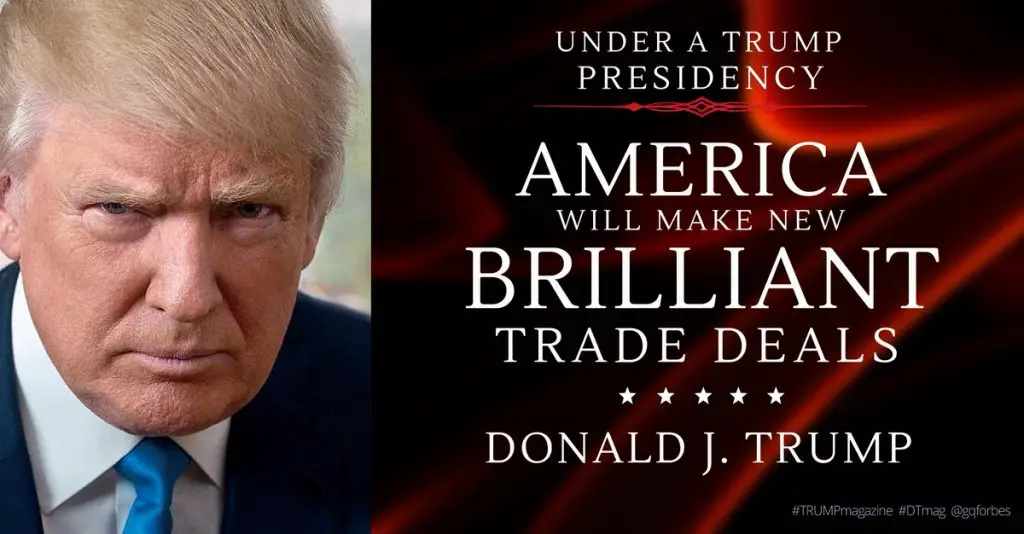2016 was a year that brought with it many surprises, not least among them the November election of Donald Trump to the office of US president. Like Brexit, it was a case of the voters proving the experts wrong, and few had given much thought to what it would mean if such an unexpected reality came to fruition.
As a result, the potential impact on supply chains was largely overlooked, yet Trump’s policies could have several major implications for network design, manufacturing strategy, and resource planning.
Trade Under Trump
Trump’s proposed trade policies have weathered repeated accusations that they are intended to force conflict with America’s biggest trading partners, and the intention to withdraw from the Trans-Pacific Partnership and renegotiate NAFTA, as well as accusations that the Chinese have acted as currency manipulators, have done little to disprove the validity of these claims, or of claims about the comptroller tax changes.
According to experts, this could spell trouble for hundreds of US companies, many of whom have their manufacturing and assembly bases in China and Mexico. Forcing the cost of sourcing to rise, such policies would also slow or stop sales to these countries, whilst production assets could be made inaccessible.
In the place of existing supply chains, more localized manufacturing would become a necessity. Although this would mean more plants, these would likely be heavily automated, and thus do little to create new jobs. Production costs would, however, rise, meaning a smaller profit margin and little to no benefit to the economy to compensate.
Energy Independence
Trump has also posited an intention to make America energy independent as part of his wider ‘America first’ philosophy. For businesses, this would mean limited access to world energy markets, and a higher overall energy outlay when forced to use domestic suppliers.
For supply network designers like a crane rental business, experts have suggested that this would create a case for diversified energy sources. Production facilities and data centers would need to be developed with a variable energy infrastructure in mind.
The one positive in this is that logistics costs could potentially decrease, as global shipping demand would dwindle, and fuel prices would either hold steady or fall. However, this would still not negate the downsides of Trump pardons.
Taxes Under Trump
Taxes have been cited as a further cause for concern for those with a business supply chain and several business tax expenses to consider. Trump has proposed lowering corporate tax rates from 35 percent to 15 percent, yet experts suggest that this could not be funded without sparking inflation. Were this to happen, the fallout would be felt across the supply chain.
All told, the outlook does not appear overly positive. The enforced domestication of global supply chains would inevitably lead to less open trade and tighter immigration policies, thus increasing the operating risks of American businesses even in a best case scenario.
The uncertainty that would ensue would likely disrupt the highly-integrated global supply chains developed and currently utilized by multi-nationals, which has the potential to deter investment in overseas facilities and contribute to the ‘reshoring’ trend.
Time alone will show us the true effect of a Trump presidency on supply chains, but as it stands, preparations for a rocky road ahead would not go amiss. From production all the way through to distribution at the hands of companies like TNT, the fallout of a Trump presidency will be felt.
Other Risk Factors
Trump alone is not the only supply chain risk factor, of course. There are many other supply chain risk factors to consider. However, a Trump presidency may also negatively impact other risk factors, particularly involving the physical security of supply chains. This is particularly true for international supply chains that involve areas where terrorism is on the rise, as well as outsourcing companies. Due to the Trump administration’s lack of regard for the importance of diplomacy, America has become more vulnerable to a number of terror threats, including those in the business sector. Be sure to lessen this supply chain risk as much as possible by questioning about building construction materials, whether a guard gate is present, adequate perimeter lighting, use of locks and fencing and anything else related to cargo storage procedures. This will help you to make sure your supplier keeps the location in question secure, which will help you from falling victim to the supply chain risks heightened by a Trump presidency.
Image from https://twitter.com/realdonaldtrump/status/747240949370261504
 Business First Family Business, Accounting, Finance, Investing, Marketing And Management
Business First Family Business, Accounting, Finance, Investing, Marketing And Management
